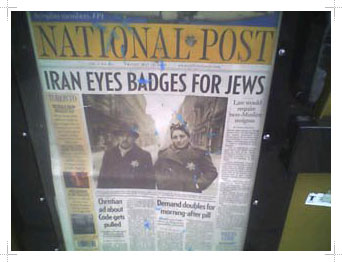The Lure of Conventional Wisdom

Recently, the New Scientist published an article online entitled "The lure of the conspiracy theory". (You'll need a subscription to read the whole thing but you can also read it here). It talks about a study done to examine the psychological angle of 'theorizing'. Here's the opening paragraph...
Was Princess Diana the victim of drunk driving or a plot by the British royal family? Did Neil Armstrong really walk on the moon or just across a film set in Nevada? And who killed President John F. Kennedy - the Russians, the Cubans, the CIA, the mafia... aliens? Almost every big event has a conspiracy theory attached to it. The truth, they say, is out there - but where exactly? Perhaps psychology can help us find at least some of the answers.
The major failing of the article is found in it's basic premise, and the methodology of the study it refers to. It equates the phrase 'conspiracy theory' to that of religious codex, and assigns all conspiracy theories with the same 'unprovable' value as any religion, in any objective sense.
Ten years ago, maybe the 'conspiracy theory' of the Gulf of Tonkin Incident would have made that opening list as well. Though it's not as fantastical as aliens in Fidel Castro masks probing JFK, many doubted the official story of the Tonkin incident, which went something like this:
The Gulf of Tonkin Incident was a pair of attacks by naval forces of North Vietnam against two American destroyers, the USS Maddox and the USS Turner Joy. The attacks occurred on 2 August and 4 August 1964 in the Gulf of Tonkin.
This was the 'conventional wisdom' that allowed the LBJ administration to launch, in earnest, the Vietnam War. However, if one reads the wikipedia entry, that opening paragraph reads a little less authoratively.
The Gulf of Tonkin Incident was an alleged pair of attacks by naval forces of the Democratic Republic of Vietnam (commonly referred to as North Vietnam) against two American destroyers, the USS Maddox and the USS Turner Joy. The attacks were alleged to have occurred on 2 August and 4 August 1964 in the Gulf of Tonkin.
In fact, it was shown that the second attack didn't occur at all (which was once just another wacky 'theory'). Conventional wisdom changes, and theories can become facts, given two parts of an equation this study ignores: Time and Information. Add more Time to the equation, and it becomes less relevant. Take away information, and it's less plausible. Conspiracists have neither the resources nor recourse to try their theories out in a forum (be it legal or journalistic) that's accepted by those who defer to 'conventional wisdom'.
Now back to the article at hand...
The study, which again involved giving volunteers fictional accounts of an assassination attempt, showed that conspiracy believers found new information to be more plausible if it was consistent with their beliefs. Moreover, believers considered that ambiguous or neutral information fitted better with the conspiracy explanation, while non-believers felt it fitted better with the non-conspiracy account. The same piece of evidence can be used by different people to support very different accounts of events.Wow. That sounds really logical and scientific, but crafting a fictitious assassination, and providing similarly fictitious 'evidence' to the subjects is hardly the realm of science, and sounds more like a story teller leading his audience down the path he wants. I'd suggest that the crafters of the story may have their own confirmation bias to work out.
But the observation is the real jaw dropper...
This fits with the observation that conspiracy theories often mutate over time in light of new or contradicting evidence. So, for instance, if some new information appears to undermine a conspiracy theory, either the plot is changed to make it consistent with the new information, or the theorists question the legitimacy of the new information.This observation is completely meaningless in the context of psychologically assessing those who delve into conspiracy theorizing (especially when the study does not qualify the prima facie value any particular theory). The observation also applies to legal prosecutors in the investigation of a crime. By replacing the word 'conspiracy' with 'scientific' in the above quote, you'll also have a perfectly legitimate reason why science turns out to be such a valuable tool to describe the universe(s?) in which we live.
Where the heck were the editors of the New Scientist before publishing this? Merely printing a headline that reads "Conspiracy theorizing is stupid" with "lorem ipsum" nonsense in the body would have been almost as informative, but I'm guessing they need all those nonsensical words to feed the members of the Orthodox Reductionist Cult who clench their Occam Razors in their conventional fists.
The reader shouldn't make assumptions about what conspiracy theories I believe or not, nor to what extent. This is merely an observation on just one of many articles on conspiracy theories to have come out over the past few years.
Personally, it makes me wonder what other outlandish, so called "psychologically generated" conspiracy theories would suddenly become 'conventional wisdom', if information were truly free, and it came out in a timely manner?
PS: I had forgotten about this post for a little while, but after reading THIS fine example of 'conventional wisdom', I decided to revisit.
Labels: conspiracy, politics


